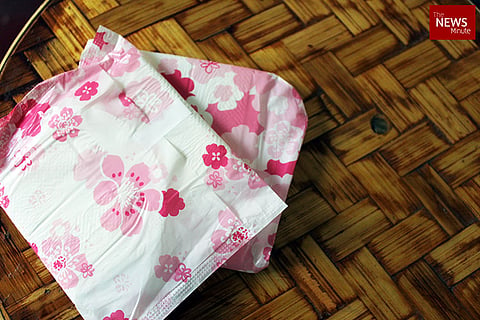

Sanitary napkins - a product that has seen much debate, discussion and deliberation has finally been scrapped off the 12% GST it attracted. So, with the GST being removed, will the cost of the product go down? The answer to that question may not be so easy.
Why? A concept called input tax credit, due to which there may not be a large margin of difference. Under GST, tax is paid in every stage -- right from the raw material stage up until the finished product is ready for sale. The manufacturer, who buys raw materials pays the taxes on that raw material, and then they pay tax on the final product. Once the manufacturer pays the tax on the final product, they can claim a return on the tax paid for inputs. Now, with GST being scrapped for sanitary napkins, manufacturers cannot claim a return on the tax he paid for inputs.
Indirect tax expert Saimukundan says that the intended effect might not actually be achieved and while the consumer may receive a marginal reduction in price, it may not make that much of a difference.
“The negative impact is that the Indian market might be flooded with Chinese goods, and therefore, the price may be competitive,” he says.
“The local manufacturers will lose because Chinese manufacturing has become a lot more economical. The importing of goods will attract much lower customs duty because GST is exempt, it is expected to go down. So, the public will be benefited because the price per unit will come down, but this will make Chinese imports competitive, so local manufacturers will end up losing,” he adds.
Saimukundan says it will actually be economical to import, as whatever advantage local manufacturers had earlier is now lost.
“It’s essentially a perception victory. I don’t think it’s more than that,” he says.
Sushmita Dev, the Silchar MP who spearheaded the petition on Change.org (which has over four lakh signatories) to ensure that sanitary napkins are exempt from GST says that it is in the greater interest of the public.
“A lot of people said that the market will be flooded with Chinese products, which I thought was a very strenuous argument for such a big cause. Wisdom has prevailed on the government.”
“I started a petition on Change.org and the biggest criticism I got was that I was trying to help big manufacturers. The advantage that the big manufacturers have is that if you make a product more reasonable, they have the capacity to distribute it in a manner which will ensure last mile delivery. Government efforts have failed when it came to distribution,” she argues.
“Any policy you roll out will have a plus and minus. I think the larger interest of women and the girl child is so much bigger than the input tax credit policy,” she adds.
While Sushmita refutes the argument that the input tax credit policy could be the reason that the scrapping of GST on sanitary napkins may not be a monumental victory, this was suggested by the government itself in a press release last July.
The government had then said that while some raw materials attracted a GST of 18%, some attracted a GST of 12%. It added that sanitary napkins were earlier taxed at 13%, which was brought to 12% under GST. The government then argued that scrapping GST puts local manufacturers at a disadvantage when compared to imports as they cannot avail input tax credit.
“Reducing the GST rate on sanitary napkins to Nil, will however, result in complete denial of ITC to domestic manufacturers of sanitary napkins and zero rating imports. This will make domestically manufactured sanitary napkins at a huge dis-advantage vis-à-vis imports, which will be zero rated,” stated the government.